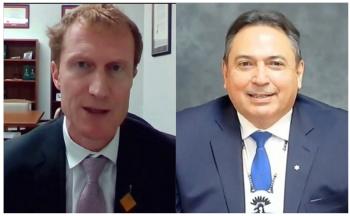Image Caption
Summary
Local Journalism Initiative Reporter
Windspeaker.com
Chiefs went back to treaty to give more power to an Assembly of First Nations’ resolution addressing priority concerns and needs for First Nations in the battle against the coronavirus pandemic.
Federation of Sovereign Indigenous Nations Chief Bobby Cameron asserted that it was “very crucial” that the famine and pestilence clause of Treaty 6 be part of the resolution.
“The famine and pestilence clause, when our chiefs of the day signed treaty, they ensured that (commitment) during these times,” he told chiefs Dec. 8 at the AFN’s virtual annual general assembly.
“COVID 2020 is a prime example of famine and pestilence.”
Red Earth Cree Nation Chief Fabian Head agreed.
“The federal government has that responsibility to come in a time of famine and pestilence where we are currently facing … I feel its important that it needs to be inserted in there,” Head said of the resolution.
Treaty 6 says a medicine chest (viewed as health care) be maintained by the Indian agent for use of the band, and that government provide assistance in times of famine and pestilence.
In March, the four First Nations of Maskwacis in Treaty 6 in Alberta declared states of emergency in response to the COVID-19 pandemic and invoked the medicine chest and famine and pestilence clauses.
Both the medicine chest and the famine and pestilence clauses were added to the resolution, which directs the AFN, “to urge the government of Canada to rectify any inequalities in their efforts to aid and support First Nations during the pandemic…”
In April, the AFN struck a national COVID-19 task force to ensure the unique needs of First Nations are addressed during the pandemic.
“First Nations experience greater health, social and economic inequities compared to the rest of Canada. This makes us particularly vulnerable to contracting COVID 19,” said task force co-chair Kevin Hart, regional chief for Manitoba.
“The AFN, the national chief, regional chiefs and our chiefs’ committees participate on various tables with the federal government, providing input into discussions related to the COVID-19 response and support.”
This collaborative approach is important, said Indigenous Services Canada (ISC) Minster Marc Miller when he addressed chiefs at the AGA Dec. 8.
“One thing that’s been reinforced over the past several months is this: When local First Nations leadership is provided with the necessary resources, you are the most successful in responding to a crisis with immediate, innovative and proactive measures to ensure the safety of your members,” said Miller.
“First Nations leadership and the AFN chiefs’ committee on health have been, and are still, instrumental beyond the ongoing efforts to address this pandemic.”
Miller said that recent outbreaks from the second wave of COVID-19 were hitting First Nations in isolated and remote communities, as well as those in urban centres, at an “extremely alarming” rate.
Figures were announced at the national press conference Dec. 12, in which Miller was joined by Dr. Tom Wong, chief medical health officer for ISC, and Health Minister Patty Hajdu.
As of Dec. 10, Wong said 5,675 First Nations COVID cases on-reserve had been reported with 2,100 having active infection. These numbers are more than 20 times higher than the peak numbers on reserves during the first wave. On-reserve fatalities sit at 49.
“It is distressing that the number of active cases has doubled in the past month,” said Wong.
For the roll-out of the vaccine, Wong said that Indigenous people, “who are disproportionately impacted,” were among the priority groups.
Six million vaccines are expected to be available in the first quarter of 2021. The Pfizer vaccine should begin to roll out next week.
Miller acknowledged that systemic racism in the health care system, and continued mistrust of that system by Indigenous peoples, makes it even more important that ISC work collaboratively with Indigenous partners.
“The logistics of the COVID-19 vaccine will require coordination with Indigenous communities, provinces, territories and other partners,” he said.
National Chief Perry Bellegarde told chiefs on Dec. 8 that the AFN would continue its work on COVID-19.
“When Canada starts rolling out a vaccine, we must ensure that First Nations people, regardless of where we live, that we’re not left out again. Now we must all join together to make sure that we’re all protected. No one is safe until we are all safe,” he said.
Vaccines will be allotted on a per capita basis but “with additional dosages for the federal populations that the federal government are responsible for, and that is on First Nations and living in First Nations communities,” said Hajdu.
The provinces and territories have the responsibility for delivering the vaccine in their jurisdictions, she said.
“We expect in urban population that Indigenous people, including Métis people that are living within urban populations, are treated like every other Canadian in that population that have access in an equitable way,” said Hajdu.
Local Journalism Initiative Reporters are supported by a financial contribution made by the Government of Canada.

